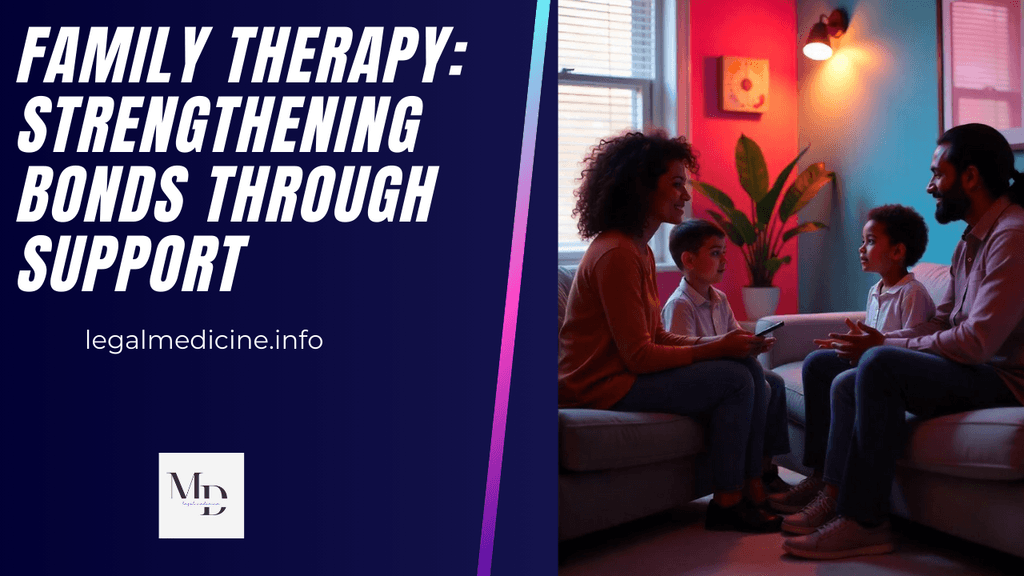Family Therapy: Strengthening Bonds Through Support

Family therapy offers a path to improved communication, healthier relationships, and resolution of conflicts. It addresses challenges families face together and individually, providing a framework to navigate life’s complexities. This blog explores the role of family focused therapists, benefits of therapy, and tips for finding support near you.
What Is Family Therapy?
Family therapy is a form of psychotherapy that focuses on improving communication and resolving issues among family members. It’s conducted by professionals such as:
- Family therapists
- Marriage and family therapists
- Family psychologists
This therapy centres on the family system, recognizing that challenges often stem from interaction patterns rather than isolated individuals.
Key Benefits of Therapy

- Improved Communication:
Therapy sessions foster open and honest dialogue, helping families better understand each other. - Conflict Resolution:
Therapists mediate conflicts, teaching families to resolve disagreements constructively. - Emotional Support:
Families learn to offer empathy and support, strengthening emotional connections. - Healthier Relationships:
Therapy equips families with tools to navigate challenges while fostering unity and mutual respect.
Who Provides Therapy?
Family Therapist
A licensed family counsellors focuses on addressing familial dynamics and promoting harmony. They specialize in managing conflicts, parenting challenges, and emotional issues.
Marriage and Family Therapist (MFT)
These professionals focus on both marital relationships and their impact on family structures. If you’re searching for “marriage and family counsellors near me,” MFTs are an excellent choice for addressing both marital and family concerns.
Family Psychologist
Family psychologists delve deeper into psychological issues affecting families, using evidence-based techniques to support mental health and relational well-being.
Finding Family Therapy Near You
When searching for family counsellors near me or family therapy near me, consider the following:
- Research Qualifications:
Look for licensed therapists with expertise in family dynamics. - Check Reviews:
Client testimonials provide insight into the therapist’s approach and effectiveness. - Assess Specializations:
Ensure the therapist specializes in your family’s specific concerns. - Explore Accessibility:
Prioritize therapists offering flexible scheduling, teletherapy, or nearby office locations.
Approaches in Family Therapy

Structural Therapy
Focuses on realigning family hierarchies and boundaries for healthier interactions.
Systemic Therapy
Examines how each member’s behaviour impacts the family as a whole.
Cognitive-Behavioral Therapy (CBT)
Teaches families to identify and change harmful thought patterns.
Solution-Focused Brief Therapy (SFBT)
Focuses on short-term goals and actionable solutions to specific challenges.
Signs Your Family May Benefit from Therapy
- Frequent conflicts or miscommunication.
- Changes in family dynamics, such as divorce or remarriage.
- Coping with grief or loss.
- Struggles with mental health conditions affecting one or more members.
- Parenting challenges or child Behavioral issues.
What to Expect in Therapy Sessions

Initial Assessment
Therapists meet with all family members to understand dynamics, identify issues, and set goals.
Therapy Techniques
Sessions often include role-playing, open discussions, and problem-solving exercises.
Progress Evaluation
Therapists periodically assess progress and adjust strategies to meet the family’s evolving needs.
The Role of Therapy in Modern Challenges
- Blended Families:
Family counsellors helps stepfamilies navigate new dynamics and build cohesive relationships. - Cultural Differences:
Therapists address the unique challenges faced by multicultural families. - Digital Age Challenges:
With technology affecting family interactions, therapy helps establish boundaries and reconnect.
How to Prepare for Therapy

- Set Goals:
Discuss what you hope to achieve with therapy. - Be Open:
Encourage all members to share their feelings honestly. - Commit to the Process:
Progress takes time; patience and dedication are crucial.
Conclusion
Family counsellors offers invaluable tools for navigating life’s challenges and fostering meaningful connections. Whether you’re addressing communication issues, coping with transitions, or strengthening bonds, seeking support from professionals like family therapists, family psychologists, or marriage and family therapists near me can make a transformative difference.
To learn more, search this:
- American Association for Marriage and Family Therapy – Explore resources and find licensed family therapists.
- Psychology Today: Find a Family Therapist – Locate family therapists near you.
FAQs
1. How long does family therapy typically last?
The duration varies but usually ranges from a few weeks to several months, depending on the family’s needs.
2. Can therapy help with blended family challenges?
Yes, therapy can assist blended families in navigating new dynamics and building trust.
3. What’s the difference between a family therapist and a family psychologist?
Family therapists focus on relational dynamics, while family psychologists delve deeper into psychological factors influencing the family.
4. Is family therapy covered by insurance?
Many insurance plans cover therapy sessions; check with your provider for specifics.
5. Can I find family therapy online?
Yes, many therapists offer virtual sessions, providing flexibility and accessibility for families.
